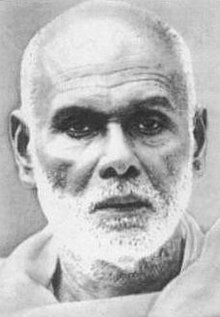Sri Narayana Guru
| Sree Narayana Guru ശ്രീ നാരായണ ഗുരു |
|
|---|---|

Sree Narayana Guru
|
|
| Born | ca. 1856 Chempazhanthy, Travancore (now Kerala, India) |
| Died | 20 September 1928 Varkala, Travancore (now Kerala, India) |
Narayana Guru, also known as Sree Narayana Guru (c. 1856 – 20 September 1928) was a social reformer of India. He was born into a Kerala family in an era when people from such communities, which were regarded as Avarna, faced much social injustice in the caste-ridden of Kerala. He led a reform movement in Kerala, rejected casteism, and promoted new values of spiritual freedom and social equality. He stressed the need for the spiritual and social uplift of the downtrodden by their own efforts through the establishment of temples and educational institutions. In the process, he denounced the superstitions that clouded the fundamental Hindu cultural convention of caste.
There are many legends surrounding the life of Narayana Guru but a few certain facts until his rise to prominence in 1887. He was born probably in 1856, the son of an Ezhava peasant, Madan and his wife Kuttiyamma, in the village of Chempazhanthy near Thiruvananthapuram. To tide over the sheer poverty of his family, Little Nanu, as he was affectionately known, worked as a cowherd for a wealthy neighbour. Once, Kummanpallil Raman Pillai Asan of Mavelikara spotted the young Nanu with his neighbour's cow. Asan's sympathy turned Nanu's entire future. He made arrangements for Nanu to join the school run by Moottha Pillai Asan, a Nair teacher of Kazhakoottam. He was educated in part by Moottha Pillai Asan and later for 6 years by Raman Pillai Asan (Asan is the Tamil/Malayalam version of the Sanskrit word 'Acharyan' which means an erudite teacher) himself with free food and accommodation at his own residence near Mavelikara. Raman Pillai Asan was the Headmaster of a Sanskrit school at Kayamkulam as well as a visiting faculty of the Sanskrit schools at Kazhakoottam and Pettah in Thiruvananthapuram. Little Nanu was deeply influenced by Vedanta and by the ideas of social equality and religious reforms as kindled by Raman Pillai Asan. Nanu taught religion and Sanskrit to local children and studied yoga with notable ascetics such as Chattampi Swami, who too was a disciple of Raman Pillai Asan. He was an itinerant yogi for some time and later immersed himself for the upliftment of people from the lower strata of the society.
...
Wikipedia
